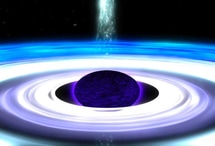By Ray Villard on April 30th, 2011 on news.discovery.com
 The sad unplugging of the Allen Telescope Array due to lack of funding brings a screeching halt, at least temporarily, to the most ambitious search for “hello” radio transmissions from E.T.
The sad unplugging of the Allen Telescope Array due to lack of funding brings a screeching halt, at least temporarily, to the most ambitious search for “hello” radio transmissions from E.T.
But perhaps it’s time to simply think far outside of the box regarding our preconceptions of how to find extraterrestrial civilizations, says Clement Vidal of the Evolution, Complexity and Cognition group at the Vrije Universiteit Brussel. And, the most advanced aliens may be the easiest to find.
In a recent paper, he emphasizes that we have to look at a variety of search strategies in solving the mystery of our cosmic loneliness — that is, if we are satisfied with simply finding E.T. and not communicating with it.
Vidal’s reasoning: The universe is so old there have to be far-advanced civilizations out there, billions of years more evolved than us. They have to be doing super-human engineering feats that are recognizable across intergalactic space. “Super-human” might also mean that the most advanced life-forms could very likely be post-biological. They have evolved far beyond being creatures of flesh and blood, as described in Arthur C. Clarke’s “2001:A Space Odyssey.“
What defines a super-civilization? In 1964, Russian astrophysicist Nikolai Kardashev proposed a scheme for classifying technologically advanced alien societies. A Type I civilization uses energy resources on a planet-wide scale, like us. A Type II civilization would have 10 billion times more energy available by trapping the total output of its central star — perhaps by building a shell around it called a Dyson sphere. A Type III civilization would tap the energy resources of an entire galaxy — only God knows how! This would give a further increase to power available by at least a factor of 10 billion.
Black Hole Appetite
Energy-hungry galactic empires might skip tapping stellar energy and simply go to extracting energy from black holes. These collapsed islands of space-time are the universe’s ultimate Energizer Bunnies. They are far more efficient at converting mass to energy than are the fusion engines of stars.But more than that, says Vidal, is the ability to control the microcosm as well. Today we can manipulate individual atoms via nanotechnology. But advanced alien physicists would tinker with elementary particles and the very structure of space-time itself.
Having mastered control over space-time, a super-civilization might want to fabricate their own black holes for a variety of tasks: waste disposal, starship propulsion, hyper-computing, maybe even time travel.
On the macro-scale, super-civilizations might re-engineer stars using black holes. The quest for immortality beyond a star’s lifetime would be a big motivation.
Suppose extraterrestrials manufacture a black hole to accrete material from a burned-out star, a white dwarf. This would provide abundant energy beyond the star’s fusion-burning stage.
But how would you prove the black hole was artificial? Tell-tale evidence would come from measurements that showed the black hole weighed less than 3.5 solar masses. That’s the minimum mass for crushing matter into a black hole via a supernova core-collapse.
Some low-mass X-ray binary stellar pairs might be artificially constructed, Vidal speculates. Or, aliens might come up with ways to control natural X-ray binaries — just as our ancestors extracted energy from waterfalls.
Curiously, NASA’s Chandra X-ray telescope has found an overabundance of these systems within several light-years of the galactic center. The central bulge of our galaxy should be the home to the oldest civilizations because of its ancient stellar population.
Homemade Universe
Civilizations may try to live forever by exploiting the time-dilation effects near a black hole to hibernate and survive into the very far-future universe. Something like this is wonderfully described in Isaac Asimov’s short story “The Last Question.” A hyper-computer called the Cosmic AC reboots the universe after our cosmos has fully entropied. After mulling over the darkness, the multidimensional machine says: “Let there be light!“
Ultimately, a super-civilization may attempt to artificially create a universe in the laboratory via black hole fabrication. This far-out notion of artificial cosmogenesis might explain why the many constants in our universe are so precisely tuned for our existence.
For example dark energy — a repulsive form of gravity — is a whopping 123 orders of magnitude weaker than what would have been predicted from quantum physics. This could not have happened by coincidence unless there is an infinity of parallel universes with their own different dark energy values, speculate some astrophysicists.
Or instead, dark energy is a signal of –- dare I say — intelligent design. I’m not implying spiritual metaphysics here, but perhaps our universe might simply be a science fair project of an entity from an exo-universe.

